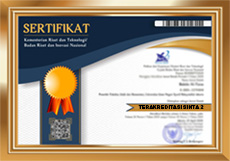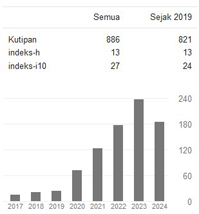PANCASILA, DEMOKRASI LIBERAL DAN KOMUNITARISME
Abstract
since the reformation era is now caught up in a procedural democracy without the
wellbeing of the people or social justice. Proceduralism is the most basic criticism
of liberal democracy by republicans and communitarians. From a communitarian
perspective, the Pancasila state ideology as the normative base and collective identity
of the Indonesian nation is able to offer a way out of the crisis of liberal democracy
as practised in Indonesia. This essay attempts to show that it is not an effort to
build a democratic order upon procedural ethics as is assumed by liberals, but rather
the need to provide a substantial ethical foundation. This is the case as a democratic
system is not filled with atomistic individuals but with social relationships. A
democratic process always moves within a society shaped by social relationships
and various complex processes for the formation of communities. Democracy is built
upon a collective identity which is formal yet fragile. In the Indonesian context, the
Pancasila is the collective expression the nation’s identity. As a collective identity,
the Pancasila will never be complete, but will always be in a state of becoming
rediscovering itself anew. In the final section, two methods are presented, namely the
method of deliberative and agonistic democracy as a way proposed by contemporary
political philosophy in overcoming conflicts in values in the face of pluralism. The
Pancasila will become the collective identity which animates the people of Indonesia,
only when it is open to a process of rational deliberation in the public sphere and is
ready to be only one alternative in the midst of a competitive discourse.
Kata-kata kunci: liberalisme, komunitarisme, Pancasila, identitas
kolektif, demokrasi, deliberasi, agonistik.
Full Text:
PDFReferences
Berlin, Isaiah Berlin, “On the Pursuit of the Ideal”, in: The New York Review
of Books 35, 1988, hlm. 11-18
Bertens, K., Pengantar Etika Bisnis, Yogyakarta: Kanisius, 2000
Bőckenfőrde, Ernst Wolfgang, Staat, Gesellschaft, Freheit. Studien zur
Staatstheorie und zum Verfassungsrecht, Frankfurt am Main: Suhrkamp,
Dami Mukese, John, “Bung Karno, SVD dan Pancasila”, dalam: Antonio
Camnahas dan Otto Gusti Madung (eds.), … ut verbum Dei currat.
Tahun SVD Indonesia, Maumere: Penerbit Ledalero, 2013
Habermas, Jürgen, Technik und Wissenschaft als Ideologie, Frankfurt am
Main: Suhrkamp, 1968
Habermas, Jürgen, Moralbewusstsein und kommunikatives Handeln, Frankfurt am Main: Suhrkamp, 1983
Habermas, Jürgen, Faktizität und Geltung, Frankfurt am Main: Suhrkamp,
Hatta, Mohamad, Kumpulan Karangen (1), Jakarta: Penerbit Bulan
Bintang, 1976
Kűng, Hans, “Leitlinien zum Weiterdenken”, dalam: Hans-Martin
Schoenherr-Mann, Miteinder Leben Lernen, Műncehen: Piper Verlag
Latif, Yudi, Negara Paripurna. Historisitas, Rasionalitas dan Aktualitas
Pancasila, Jakarta: Kompas Gramedia, 2011
Madung, Otto Gusti, “Etos Global dan Dialog Peradaban”, dalam Kompas
Februari 2010
Magnis-Suseno, Franz, Etika Politik. Prinsip-prinsip Moral Dasar Kenegaraan
Moderen, Jakarta: Gramedia Pustaka Utama, 1999
Magnis-Suseno, Franz, Pijar-Pijar Filsafat, Yogyakarta: Penerbit Kanisius,
Mouffe, Chantal, Űber das Politische. Wider die kosmopolitische Illusion,
Frankfurt am Main: Suhrkamp, 2007
Mouffe, Chantal, Das demokratische Paradox, Wien: , 2008.
Nasution, Adnan Buyung, Demokrasi Konstitusional, Jakarta: Penerbit Buku
Kompas, 2011
Rawls, John, Eine Theorie der Gerechtigkeit, Frankfurt am Main: Suhrkamp,
(1971)
Reder, Michael, Hanna Pfeifer, Maria-Daria Cojocaru, „Was hält
Gesellschaft zusammen? Eine Einführung“, in: idem, Was hält
Gesellschaft zusammen? Der gefährdete Umgang mit Pluralität, Stuttgart:
Kohlhammer, 2013.
Sena Utama, Wilden, “Negara (dan) Islam. Sekitar Polemik Soekarno
dan Natsir”, dalam: Prisma. Majalah Pemikiran Sosial Ekonomi, Edisi
Khusus/Vol. 32, No. 2 dan No. 3, 2013.
Suhelmi, Ahmad, Polemik Negara Islam: Soekarno vs Natsir, Jakarta: UI
Press, 2012.
Tim Nusa Indah, Bung Karno dan Pancasila: Ilham dari Flores untuk
Nusantara, Ende: Penerbit Nusa Indah, 2006
Walzer, Michael, Sphären der Gerechtigkeit. Ein Plädoyer für Pluralität und
Gleichheit, Frankfurt am Main: Campus Verlag, 1992
Welsch, Wolfgang, Vernunft. Die zeitgenössische Vernunftkritik und
das Konzept der transversalen Vernunft, Frankfurt am Main:
Suhrkamp, 1995
DOI: http://dx.doi.org/10.31385/jl.v13i2.76.311-336
Refbacks
- There are currently no refbacks.

Copyright© 2015 JURNAL LEDALERO This work is licensed under a Creative Commons Attribution-NonCommercial-ShareAlike 4.0 International License.
Institut Filsafat dan Teknologi Kreatif Ledalero Jalan Trans Maumere-Ende - Sikka - Flores - Nusa Tenggara Timur - Indonesia Telp/Fax: 0382 2426535










